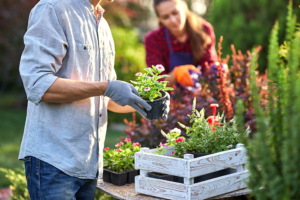The onset of spring brings with it a wealth of new opportunities. As temperatures warm, new therapeutic options become available to explore for all those looking to either begin constructing new daily routines in their sobriety or looking for new ways to tackle the complicated and difficult process of maintaining one’s aversion to drugs or alcohol. Gardening, while a seasonal practice, can also be a profound therapeutic outlet that can reward an individual’s determination and effort, all while helping them continue to practice responsibility in their lives and adding a needed element of structure and consistency to a daily routine.
The Benefits of Time-Consuming Hobbies
Addiction can dictate much of a person’s daily life. Whether an individual is in recovery from an addiction to drugs, alcohol, gambling or any other dependency, these issues can be the driving force behind how a person structures their day. A person may only make plans based on their proximity to an addictive substance or behavior, and the use of an addictive substance may take up a large portion of that person’s waking hours.
Whether a person feels the urge to use drugs immediately when they get out of bed or get off work and spend the rest of the evening drinking, a great deal of time can be consumed while engaging with addictive substances and behaviors. As an individual ends their addictive practice, it is important to fill that time with new activities to avoid falling back into old habits. Gardening is an incredible way to fill this time.
Gardening is a slow process, and growing and maintaining a garden takes constant effort. However, the practice of cultivating soil fills the space that a person would otherwise associate with using an addictive substance. Keeping time filled and structured is a great way to help alleviate urges and mitigate the chances of relapse. Gardening is an outlet that can be as involved as a person’s needs requires. They can fill their days with positive, productive activities, from planting new flowers, harvesting herbs and vegetables, or even simply weeding and watering the plants.
Adding Structure to the Day
Gardening requires routine tasks that involve a good deal of repetition. However, this also aids in helping an individual structure their days and manage their time. These skills are essential for those in recovery and can translate to many other goals that an individual may set for themselves. Keeping a regular time for watering plants, a weekly schedule for tending the garden and even maintaining soil can all be a foundation to structure one’s day in their new, sober life. Time management and daily responsibilities can help a person through their day and continue to prepare an individual to reenter the workforce or take on other responsibilities. Recovery from an addiction of any kind involves a great deal of change and finding a therapeutic outlet that adds consistency amidst this change can be a potent tool.
The Power of Creation
There is something compelling about creation in recovery. Art, music, writing and gardening, amongst other practices, can guide a person through creating something important to them personally, whether it be a drawing, poem or a garden. The power of this creation doesn’t come from any monetary value that may be attached to it, but rather, having tangible evidence of one’s success and agency over a situation. Addiction recovery has a huge emotional toll. Having physical proof that a person is giving their all to their sobriety and overcoming many personal difficulties to accomplish the goals that led to their creation can be a reminder of their agency over their own time and energy.
A Way to Look Forward
Addiction recovery demands a lot from those pursuing sobriety. It can be difficult to come to terms with one’s past and mistakes while keeping motivated for the future. Having a sense of success and progress reinforced daily is necessary to help each individual maintain the path to their goals. Gardening helps a person look only at their present and future identity rather than dwell on the past. Growing a garden doesn’t take into account one’s history, and the rewards are based solely on the ongoing effort a person puts into it. There is no kind of preconceived notions about success or judgment about one’s past actions.
Gardening is a way for a person to measure only who they are in the present and the effort and dedication they are putting into their new, sober lives. Having a constant reinforcement of progress and a reminder of one’s commitment can help each day start with the structure and positivity it needs to continue down a healthy and sober path.
Addiction recovery is a personal journey, and gardening is just one way you can learn to manage time and energy while reinforcing your success and sobriety through the difficult process. At Avalon Malibu, we employ many other therapeutic approaches to help you find your best practices in sobriety. If you or a loved one are ready to take the first step towards regaining control over your daily life, we offer detox services, residential treatment, partial hospitalization programs and intensive outpatient programs, each of which can be individualized depending on your needs and goals. Art therapy, music therapy, yoga and even physical approaches to your recovery, such as our seasonal ropes course, are all available to help you discover your most effective practices alongside our caring professionals. For more information on how we can individualize your approach to sobriety, as well as strategies you can employ from home during aftercare, call to speak to one of our trained staff members today at (844) 857-5992.












